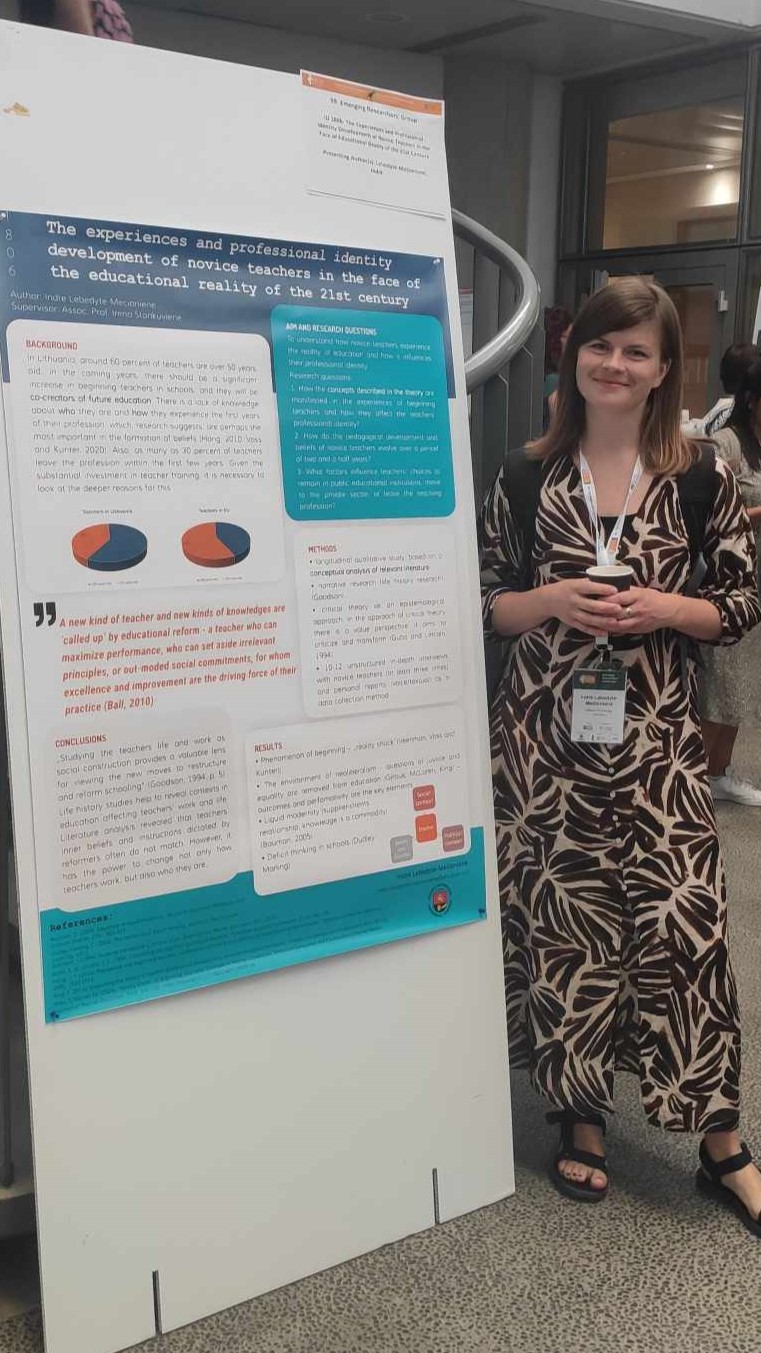Indrė Lebedytė-Mečionienė is a PhD student in Educational Sciences at Vilnius University, Lithuania. She explores education both as a researcher and as a practitioner, since she also works as a chemistry teacher. Her personal experience led her to the topic and area of interest for her PhD project: the experience of beginning teachers, “reality shock”, the impact of educational reforms on teachers' experiences. She has also developed an interest in the perspective of critical pedagogy and narrative research.
"The Experiences and Professional Identity Development of Novice Teachers in the Face of Educational Reality of the 21st Century"
The poster presents the PhD project “The experiences and professional identity development of novice teachers in the face of the educational reality of the 21st century”. In Lithuania, around 60 percent of teachers are over 50 years old. In the coming years, there should be a significant increase in beginning teachers in schools, and they will be co-creators of future education. There is a lack of knowledge about who they are and how they experience the first years of their profession, which, research suggests, are perhaps the most important in the formation of beliefs (Hong, 2010, Voss and Kunter, 2020).
The research aims to understand how novice teachers experience the reality of education and how this influences their professional identity. This will be a longitudinal qualitative study, based on a conceptual analysis of relevant literature and narrative research (life history research) (Goodson, 1994). Approximately 10 beginning teachers will be followed over a 2.5-year period, with data collected through at least three in-depth interviews with each teacher, as well as personal reports of critical incidents.
A partial literature review has been conducted and is presented in the poster. First, it is important to recognize that the experiences of beginning teachers are unique and often described as a “reality shock” (Veenman, 1984, Voss and Kunter, 2020). This occurs because teaching is considered a plateau profession, where responsibilities at the start of a teaching career are similar to those after ten or twenty years. Despite these challenges, which were researched as early as the 1970s and 1980s, it is crucial to analyze the environment of the 21st century in greater depth:
- The Environment of Neoliberalism: questions of justice and equality are removed from education (Giroux, McLaren, King) – outcomes and performativity are the key elements. Teachers must adjust their values to function effectively within this framework.
- Liquid Modernity (Bauman, 2005): in a world where nothing is stable, the educational system is required to adapt and change constantly, making teachers the epicenter of this transformation.
- Deficit Thinking in Schools: This prevalent mindset, from the perspective of its critics, is one of the reasons for social reproduction in education (Dudley-Marling, 2015).
The literature analysis revealed that teachers' inner beliefs often conflict with the instructions dictated by reformers. However, these reforms have the power to change not only how teachers work but also who they are. “A new kind of teacher and new kinds of knowledges are ‘called up’ by educational reform—a teacher who can maximize performance, who can set aside irrelevant principles or outdated social commitments, and for whom excellence and improvement are the driving forces of their practice” (Ball, 2003). This study aims to contribute to the understanding and recognition of these “new kinds of teachers” and their experiences.
